题目内容
Technology is making life easier for some dairy farmers. They use robotic systems to milk their cows. Cows are trained to follow a series of paths that lead to milking stations. Only one cow at a time can enter a station.
Once inside,the cow is rewarded with food. As the cow eats,a robotic arm cleans and connects the animal to the milking machine. A few minutes later,milking is complete. The gate is opened,the cow is released and the next cow enters.
The robotic systems are designed to operate 24 hours a day. The cows get to decide when they want to be milked. Cows are milked an average of about three times a day. Some are milked four to six times a day.
The cows wear collars around their necks that identify them to the system. A computer keeps records on their eating and milking. A cow is released from the station if the computer decides it should not be milked.
The automated system also measures the temperature and color of freshly produced milk. Milk is thrown away if it does not pass the tests.
Professor Plaut believes the systems will appeal especially to the next generation of farmers. She means young people who are more interested in technology and less interested in working all the time on the farm. Still,she says the price of robotic milking systems will continue to limit their use.
Doug and Tina Suhr have more than 100 cows on their family farm. Last year it became the fourth farm in southeast Minnesota to get a robotic milking system. A recent story in a local agricultural newspaper said the first robot costs 175,000 dollars. The second costs 150,000 dollars.
Doug told AgriNews that wages that would have been paid for one employee in five years will pay for one robot. He says the increase in milk production reaches a high of more than six kilograms per cow per day.
1.According to Doug,what is the wage of an employee per year?
A.$150,000~$175,000. B.$150,000~$30,000.
C.$30,000~$35,000. D.over $75,000.
2.Besides milking cows,the robotic system also can ________.
A.judge the quality of fresh milk
B.keep fresh milk for two weeks
C.adjust the temperature of milking stations
D.improve the appetite of cows
3.Why is the robotic system not popular now?
A.Because it usually causes the waste of milk.
B.Because it is difficult to learn how to use it.
C.Because young people have no interest in it.
D.Because people can't afford to buy it.
4.From the first paragraph,we can infer ________.
A.cows can be raised by robots in the future
B.robots direct cows into milking stations
C.the robotic system is designed to reduce labor
D.cows are kept clean by robots on some farms

